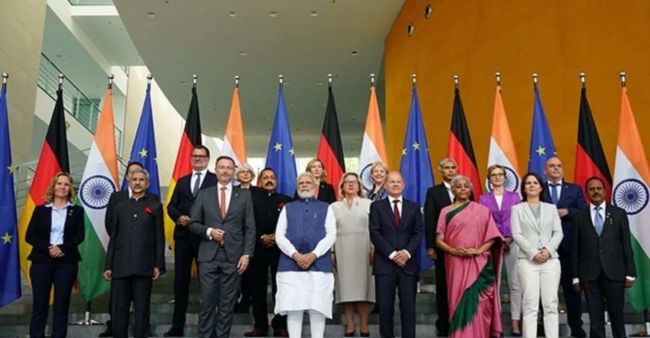G20 under Bharat’s presidency saw many achievements that would define 21st-century geopolitics and India’s stature in the global arena. Amidst the consensus-based adoption of the Delhi Declaration with the highest-ever outcomes, the creation of the Global Biofuels Alliance, and the launch of the India-Middle East-Europe Corridor, one of the most remarkable decisions was the inclusion of the African Union (AU) into G20. This was achieved with the vision and effective leadership of Prime Minister Narendra Modi and his perspective of championing the voice of the Global South.
Bharat championed the cause of AU inclusion as PM Modi understands that Africa’s significance transcends its vast resources; it extends to the global pursuit of sustainable development and inclusive growth. The continent boasts abundant reserves of minerals, oil, and natural gas, which are essential for the world’s energy needs and industrial production. Furthermore, Africa’s agricultural potential is vast, making it a key player in ensuring food security for the world’s growing population.
In the realm of sustainable development, Africa’s potential for renewable energy generation is vast, with solar and wind energy resources in abundance. Investing in these sustainable energy sources can not only meet the continent’s energy needs but also contribute to mitigating global climate change.
Moreover, the world cannot ignore Africa’s demographic dividend, with its youthful population representing a significant workforce that can propel global economic growth when empowered with the right education and job opportunities. Africa is also a continent of rich cultural diversity, making it a global centre for intercultural dialogue and understanding.
However, Africa has become the new frontier for geopolitical rivalries, primarily between established superpowers and aspirational superpowers. Both the emerging US and China blocs have increased their engagement with African nations to secure access to resources, markets, and strategic influence. This competition underscores Africa’s growing significance in shaping global politics.
China’s Belt and Road Initiative (BRI) has seen significant investments in African infrastructure projects, providing economic opportunities but also raising concerns about debt dependency. Meanwhile, the United States has been keen to counterbalance China’s influence in the region, leading to increased diplomatic, economic, and military engagements.
For India, Africa holds immense strategic importance. It is a source of essential raw materials, including minerals, oil, and natural gas, which are crucial for India’s industrial and energy needs. Additionally, Africa presents a vast market for Indian goods and services, contributing to India’s economic growth and export diversification.
Furthermore, Africa’s support at international forums, particularly on issues of mutual concern like climate change, terrorism, and United Nations reforms, is pivotal for India’s global aspirations. African nations have historically supported India’s positions and aspirations in these multilateral forums.
In this context, the India-Africa Forum Summits were initiated to deepen India’s engagement with African nations across various sectors, including trade, investment, infrastructure development, education, and healthcare. These summits aimed to foster economic and political cooperation while also addressing common challenges faced by both India and Africa. The previous summits in 2008, 2011, and 2015 yielded immense positive outcomes and increased collaboration.
The last India-Africa Forum Summit took place in 2015 in New Delhi. Since then, much has changed geopolitically, economically, and in terms of global priorities. To continue building on the achievements of previous summits and adapt to the evolving global landscape, it is imperative that India hosts the fourth summit.
The fourth India-Africa Forum Summit will provide an opportunity to revitalize and deepen the partnership between India and Africa. It can focus on key areas such as trade diversification, infrastructure development, technology transfer, capacity building, and healthcare collaboration. It will also allow for the exploration of innovative ways to address the challenges posed by pandemics and climate change.
By hosting the fourth India-Africa Forum Summit, India can further enhance its leadership role within the Global South. Strengthening ties with African nations and showcasing its commitment to their development will bolster India’s influence in international forums such as BRICS, G20, and the United Nations. This will enable India to represent the interests of the Global South and advocate more effectively for their concerns on the global stage.
Thus, in a world grappling with complex challenges such as climate change, global health crises, and geopolitical tensions, the partnership between India and Africa is more critical than ever. Africa’s potential for sustainable development, its role in global geopolitics, and its importance to India’s economic growth make it a key player in shaping the future.
The fourth India-Africa Forum Summit holds the promise of reinvigorating this partnership, fostering mutual growth, and advancing common interests. As India steps forward to host this summit, it not only strengthens its bond with Africa but also reaffirms its commitment to being a global leader in the pursuit of sustainable and inclusive development, integration with the Global South, and the promotion
- Lakshit Mittal is track chair at Y20, the youth engagement group of G20.

